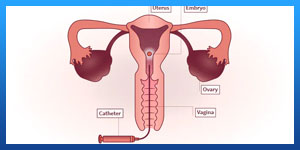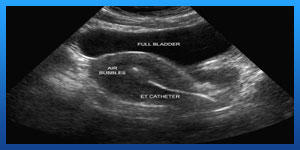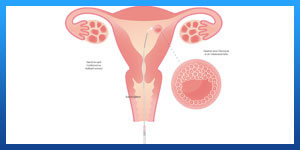Dos and Don’ts after Embryo Transfer
When you’re going through in vitro fertilization (IVF), the day when your doctor actually transfers the embryo into your uterus may seem like a dream — one that’s far away on the horizon.
So, when the big day finally arrives, it’s quite an event! In fact, it’s probably safe to say that the embryo transfer is one of the highest points in the IVF process for most people.
Afterward, you may feel like you’re on pins and needles, impatiently waiting to find out if it was successful. You may be wondering what you should do after your embryo transfer — and what you should avoid doing.
To some degree, pregnancy success after an embryo transfer has very little to do with the precautions you take. Still, there are a few things you can do that may help.
Read more about : Do IVF babies look like Mom or Dad ?
Read more about : Surrogacy in Iran

________________________________________________________________________________________
Infertility Treatment with Iranian Surgery Specialists
Iranian Surgery doctors have helped thousands of people begin or expand their families over the years. Your compassionate team of experts can evaluate the cause of your infertility, and help you find a treatment plan that's the right fit for you.
Iranian Surgery specialists in obstetrics and gynecology are leaders in infertility treatments, and will work with you to conceive via medication, surgery, in vitro fertilization (IVF) or another method.
Iranian Surgery doctors have extensive experience in diagnosing and treating infertility in couples. Each year, our experts see nearly 400 men and women with infertility issues.
Advanced diagnosis and treatment
Our team is a leader in advanced infertility treatments, including oocyte preservation, fertility preservation, and treatment of uterine fibroids and endometriosis. So, you can freeze oocytes to create an appropriate number of embryos. The Iranian Surgery team is constantly assessing the latest evidence in fertility treatments to give you the best options while minimizing delays and unnecessary tests.

_________________________________________________________________________________________________________________

Dr. Maryam Khosromehr
- Dr. Maryam Khosro Mehr is a gynecologist and infertility specialist and has a specialized board. Dr. Khosro Mehr is present in the obstetrics and gynecology department of Pars, Pasteurno and Sarem hospitals.
Educational background:
General Practitioner. Shahid Beheshti University of Medical Sciences
Specialist in General Surgery . Shahid Beheshti University of Medical Sciences
Advanced Laparoscopic Fellowship. Iran University of Medical Sciences
TQM (Total Quality Management) course.

Dr. Zolghadri
Dr. Jaleh Zolghadri is a specialist reproductive medicine and Infertility, IVF and recurrent pregnancy loss since 1992
- Professional Work Experience
1- Specialist Reproductive Medicine and Infertility, IVF and recurrent pregnancy loss since 1992
2- Reproductive Surgery (laparoscopic and Hysteroscopic procedures)
3- Full Professor of OB/GYN, Consultant, Shiraz University of Medical Sciences since 1990.4- Working and supervising infertility fellowship residents in ART & Infertility ward (1991 -2020)
5- Head of the Recurrent Abortion clinic, Shiraz University of Medical Sciences (since 1998)
6- performing many infertility techniques like Microinjection ,Zift, Egg and Embryo donation, Surrogate uterus ,Sex selection, and PGD/PGS
7-Infertility Consultant in Avicenna center of Infertility and recurrent miscarriage
8- Preforming many female Cosmetic surgery like Labioplasty, vaginal rejuvination, tightening and whitening by Monaliza Laser and labia filler injection,PRP and other Aesthetic procedures.
- Membership in major
- professional societies
1- Member of American Society for Reproduction Medicine (ASRM)
2- Member of American Association of Gynecologic Laparoscopists (AAGL)
3- Member of Middle East Fertility Society (MEFS)
4- Member of Iranian Society for Reproduction Medicine (ISRM)
5- Member of Iranian Society of Surgeon
6- member of American Aesthetic Surgery Society
_________________________________________________________________________________________________________________
Things you should do
Ready to be proactive? Of course you are. Here are some things that you’ll want to do after your embryo transfer.
- Pamper yourself for a couple of days
You’ve just undergone a potentially life-changing procedure! Indulge in a little self-care as you celebrate this transition and wait for the next step.
After the transfer, the hope is that the embryo will implant. It takes a couple of days, so give yourself a few days to relax and rest. Some experts will suggest that you to take some time off, if you can, and some might even gently suggest that you skip the vigorous workouts.
But don’t worry. You certainly don’t have to go on bed rest or lie down all the time. The embryo isn’t going to fall out if you don’t keep your feet up. But if you want to use this as an excuse to get your partner to mow the lawn or go grocery shopping, we won’t tell.
- Keep taking your medications
It might be tempting to abandon the medication you were taking prior to your embryo transfer, but you definitely don’t want to do that without talking to your doctor first.
Many women need to keep taking progesterone in the early weeks after the transfer to give their pregnancy the best chance to continue. Progesterone is an important hormone that’s critical to sustaining a pregnancy, which is why it’s typically used in assisted reproduction like IVF. It helps the embryo implant (and stay implanted) in the uterus.
So yes, we know those progesterone vaginal suppositories and injections are annoying, but hang in there. If you’re still taking them after your transfer, it’s for good reason.
Another med that your doctor might recommend that you take is baby aspirin. Research suggests that a low dose of aspirin can improve your implantation and pregnancy outcomes. For example, one small study of 60 women found that aspirin therapy led to better outcomes for those who had a frozen‐thawed embryo transfer (FET).
Nevertheless, more research is needed, and aspirin isn’t right for everyone. What we’re saying is this: If your doctor wants you on it, keep taking it until you’re told to stop.
- Eat a healthy diet
If all goes according to plan, you’ll be growing a small person inside your body for the next 9 months. This is a great time to embrace the healthy eating habits that experts recommend for pregnant women.
Ideally, you’ll want to eat a variety of fruits and vegetables, as well as foods rich in calcium, protein, B vitamins, and iron. Even if you’re eating healthy, though, go ahead and add a prenatal vitamin to your routine.
Read more about : Frozen Embryo Transfer Step by Step
- Start taking a daily folic acid supplement
If you’re not already taking a folic acid supplement, now’s the time to start! There’s a lot of upside to taking folic acid when pregnant. You need 400 mcg of this important B vitamin to prevent neural tube defects.
A 2015 review of research studies found that maternal supplementation with folic acid is also associated with a lower risk of congenital heart defects in babies. Plus, research suggests that folic acid might reduce the chances that your baby will experience a cleft lip or palate.
Most of the time, your prenatal vitamin will contain all the folic acid you need. One note: If you’ve had a previous pregnancy or child with a neural tube defect, your doctor might want you take a higher amount, so be sure to ask about that.
- Pay attention to endocrine-disrupting chemicals
Start paying close attention to household products and other gear that you use. You may want to try to avoid using products that contain substances like bisphenol A (BPA), phthalates, parabens, and triclosan, among others — or try to reduce your exposure to them. These are called endocrine-disrupting chemicals, or EDCs.
EDCs are chemicals that can interfere with the way that your body’s hormones are supposed to work. According to the Endocrine Society, some EDCs can cross the placenta and become concentrated in your baby’s bloodstream at a very sensitive time in their development.
These chemicals can even interfere with the development of your baby’s organs in utero. Later, that early exposure to high levels of these chemicals may cause other developmental issues.
So, if you’re shopping for a new water bottle, try to purchase one with a label that tells you that it’s BPA-free. And look at the label of your favorite sunscreen to make sure it’s free of EDCs.
Read more about : How many days after period is frozen embryo transfer?
Things you shouldn’t do
Of course, there are a few things you probably want to avoid doing in the hours and days after your embryo transfer to give your embryo a great start.
- Have sex
It’s best to indulge in a little pelvic rest after your embryo transfer, research suggests. Why? Sexual intercourse can trigger uterine contractions, which can disrupt the embryo that was just transferred into your body. Worst case scenario: It could prevent the embryo from implanting in your uterus or lead to a miscarriage.
Don’t worry. This will just be a temporary interlude.
- Take a pregnancy test right away
The temptation to pee on a stick right away is going to be huge. But try to resist the urge to take a pregnancy test right away. It can take up to a couple of weeks from transfer day until the placenta cells start producing enough of the hormone known as human chorionic gonadotropin (hCG) to be detected by a blood test.
Mark the days off on your calendar until you can return to your doctor’s office, and they can run a test to confirm the pregnancy.
- Ignore troubling symptoms
You might want to keep an eye out for certain symptoms that could occur in the days after your transfer.
Women taking fertility drugs may develop a condition called ovarian hyperstimulation syndrome (OHSS). This can happen when your body responds dramatically to the injected hormones that you were taking as part of the IVF process.
OHSS can cause symptoms like:
. Abdominal pain
. Abdominal bloating
. Nausea
. Vomiting
. Diarrhea
These symptoms can be mild, but they can also get worse very quickly if you have a serious case of this syndrome.
If you suddenly gain some weight or feel severe pain in your belly, don’t wait. Call your doctor and describe your symptoms so you can figure out what to do next.
Read more about : What happens when Bartholin cyst bursts?
Read more about : Bartholin Cyst Surgery
Read more about : Ovarian Cyst Removal Surgery





3 Comments
Hi,
Wow, a Very Nice blog post! Your site has given the best information From Your Articles. They are amazing and Useful to all people. Thank you for sharing this post and Impressive site. The IVF advanced is one of the most excellent centers in Asia Pacific, with Techniques, genuine Treatment, Research & Training. The IVF advanced is the leading Test Tube Centre in the country with modern world-class scientific technologies.
hello I’m nikoo addams,28 year old and Im going to get an embryo transfer soon
my question is if I can bend down after getting embryo transfer
hey Nikoo, hope it goes all well
it is within this time frame that an embryo has to “attach” to the uterine wall before it can fully implant, which may take several days. Therefore, for the first one to two days, stay home and chill out. Avoid vigorous activities such as heavy lifting, bending or exercise.